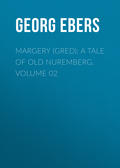
Georg Ebers
The Emperor. Volume 06
The Emperor asked for a private room, but they were all occupied, and he was requested to wait a little while, for that one of the adjoining. rooms would very soon be vacant. He had taken off his mask, and though he was not particularly afraid of being recognized in his disguise he chose a couch that was screened by a broad pillar in one of the arcades at the inner side of the court, and which, now that evening was beginning to fall was already in obscurity. There he ordered, first some wine and then some oysters to begin, with; while he was eating these he called one of the superintendents and discussed with him the details of the supper he wished presently to be served to himself and his two guests. During this conversation the bustling host came to make his bow to his new customer, and seeing that he had to do with a man fully conversant with all the pleasures of the table, he remained to attend on him, and entered with special zeal into Hadrian's various requirements.
There was, too, plenty to be seen in the court, which roused the curiosity of the most inquisitive and enquiring man of his time. In the large space enclosed by the arcades, and under the eyes of the guests, on gridirons and hearths, over spits and in ovens the various dishes were prepared which were served up by the slaves. The cooks prepared their savory messes on large, clean tables, and the scene of their labors, which, though enclosed by cords was open to public gaze was surrounded by a small market, where however only the choicest of wares were displayed.
Here in tempting array was every variety of vegetable reared on Greek or Egyptian soil; here speckless fruits of every size and hue were set out, and there ready baked, shining, golden-brown pasties were displayed. Those containing meat, fish or the mussels of Canopus were prepared in Alexandria itself, but others containing fruit or the leaves of flowers were brought from Arsinoe on the shores of Lake Moeris, for in that neighborhood the cultivation of fruit and horticulture generally were pursued with the greatest success. Meat of all sorts lay or hung in suitable places; there were juicy hams from Cyrene, Italian sausages and uncooked joints of various slaughtered beasts. By them lay or hung game and poultry in select abundance, and a large part of the court was taken up by a tank in which the choicest of the scaly tribes of the Nile, and of the lakes of Northern Egypt, were swimming about as well as the Muraena and other fish of Italian breed. Alexandrian crabs and the mussels, oysters, and cray-fish of Canopus and Klysma were kept alive in buckets or jars. The smoked meats of Mendes and the neighborhood of Lake Moeris hung on metal pegs, and in a covered but well-aired room, sheltered from the sun lay freshly-imported fish from the Mediterranean and Red Sea. Every guest at the 'Olympian table' was allowed here to select the meat, fruit, asparagus, fish, or pasty which he desired to have cooked for him. The host, Lykortas, pointed out to Hadrian an old gentleman who was busy in the court that was so prettily decorated with still-life, engaged in choosing the raw materials of a banquet he wished to give some friends in the evening of this very day.
"It is all very nice and extremely good," said Hadrian, "but the gnats and flies which are attracted by all those good things are unendurable, and the strong smell of food spoils my appetite."
"It is better in the side-rooms," said the host. "In the one kept for you the company is now preparing to depart. In behind here the sophists Demetrius and Pancrates are entertaining a few great men from Rome, rhetoricians or philosophers or something of the kind. Now they are bringing in the fine lamps and they have been sitting and talking at that table ever since breakfast. There come the guests out of the side room. Will you take it?"
"Yes," said Hadrian. "And when a tall young man comes to ask for the architect Claudius Venato, from Rome, bring him in to me."
"An architect then, and not a sophist or a rhetorician," said mine host, looking keenly at the Emperor.
"Silenus,—a philosopher!"
"Oh the two vociferous friends there go about even on other days naked and with ragged cloaks thrown over their lean shoulders. To-day they are feeding at the expense of rich Josephus."
"Josephus! he must be a Jew and yet he is making a large hole in the ham."
"There would be more swine in Cyrene if there were no Jews; they are Greeks like ourselves, and eat everything that is good."
Hadrian went into the vacant room, lay down on a couch that stood by the wall, and urged the slaves who were busied in removing the dishes and vessels used by his predecessors, and which were swarming with flies. As soon as he was alone he listened to the conversation which was being carried on between Favorinus, Florus, and their Greek guests. He knew the two first very well, and not a word of what they were saying escaped his keen ear.
Favorinus was praising the Alexandrians in a loud voice, but in flowing and elegantly-accented Greek. He was a native of Arelas—[Arles]—in Gaul, but no Hellene of them all could pour forth a purer flow of the language of Demosthenes than he. The self-reliant, keen, and vivacious natives of the African metropolis were far more to his taste than the Athenians; these dwelt only in, and for, the past; the Alexandrians rejoiced in the present. Here an independent spirit still survived, while on the shores of the Ilissus there were none but servile souls who made a merchandise of learning, as the Alexandrians did of the products of Africa and the treasures of India. Once when he had fallen into disgrace with Hadrian, the Athenians had thrown down his statue, and the favor or disfavor of the powerful weighed with him more than intellectual greatness, valuable labors, and true merit.
Florus agreed with Favorinus on the whole, and declared that Rome must be freed from the intellectual influence of Athens; but Favorinus did not admit this; he opined that it was very difficult for any one who had left youth behind him, to learn anything new, thus referring, with light irony, to the famous work in which Florus had attempted to divide the history of Rome into four periods, corresponding to the ages of man, but had left out old age, and had treated only of childhood, youth, and manhood. Favorinus reproached him with overestimating the versatility of the Roman genius, like his friend Fronto, and underrating the Hellenic intellect.
Florus answered the Gaulish orator in a deep voice, and with such a grand flow of words, that the listening Emperor would have enjoyed expressing his approbation, and could not help considering the question as to how many cups of wine his usually placid fellow-countryman might have taken since breakfast to be so excited. When Floras tried to prove that under Hadrian's rule Rome had risen to the highest stage of its manhood, his friend, Demetrius, of Alexandria, interrupted him, and begged him to tell him something about the Emperor's person. Florus willingly acceded to this request, and sketched a brilliant picture of the administrative talent, the learning, and the capability of the Emperor.
"There is only one thing," he cried eagerly, "that I cannot approve of; he is too little at Rome, which is now the core and centre of the world. He must need see every thing for himself, and he is always wandering restlessly through the provinces. I should not care to change with him!"
"You have expressed the same ideas in verse," said Favorinus.
"Oh! a jest at supper-time. So long as I am in Alexandria and waiting on Caesar I can make myself very comfortable every day at the 'Olympian table' of this admirable cook."
"But how runs your poem?" asked Pancrates.
"I have forgotten it, and it deserved no better fate," replied Florus.
"But I," laughed the Gaul, "I remember the beginning. The first lines, I think, ran thus:
"'Let others envy Caesar's lot;
To wander through Britannia's dales
And be snowed up in Scythian vales
Is Caesar's taste—I'd rather not?'"
As he heard these words Hadrian struck his fist into the palm of his left hand, and while the feasters were hazarding guesses as to why he was so long in coming to Alexandria, he took out the folding tablet he was in the habit of carrying in his money-bag, and hastily wrote the following lines on the wax face of it:
'Let others envy Florus' lot;
To wander through the shops for drink,
Or, into foolish dreaming sink
In a cook-shop, where sticky flies
Buzz round him till he shuts his eyes
Is Florus' taste—I'd rather not?'
[From verses by Hadrian and Florus, preserved in Spartianus.]
Hardly had he ended the lines, muttering them to himself with much relish as he wrote, when the waiter showed in Pollux. The sculptor had failed to find Antinous, and suggested that the young man had probably gone home; he also begged that he might not be detained long at supper, for he had met his master Papias, who had been extremely annoyed by his long absence. Hadrian was no longer satisfied with the artist's society, for the conversation in the next room was to him far more attractive than that of the worthy young fellow. He himself was anxious to quit the meal soon, for he felt restless and uneasy. Antinous could no doubt easily find his way to Lochias, but recollections of the evil omens he had observed in the heavens last night flitted across his soul like bats through a festal hall, marring the pleasure on which he again tried to concentrate it, in order to enjoy his hours of liberty.
Even Pollux was not so light-hearted as before. His long walk had made him hungry, and he addressed himself so vigorously to the excellent dishes which rapidly followed each other by his entertainer's orders, and emptied the cup with such unfailing diligence, that the Emperor was astonished: but the more he had to think about, the less did he talk.
Pollux, to be sure, had had his answer ready for his master, and without considering how easy it would have been to part from him in kindness, he had shortly and roundly quitted his service. Now indeed he stood on his own feet, and he was longing to tell Arsinoe and his parents of what he had done.
During the course of the meal his mother's advice recurred to his mind: to do his best to win the favor and good will of the architect whose guest he was; but he set it aside, for he was accustomed to owe all he gained to his own exertions, and though he still keenly felt in Hadrian the superiority of a powerful mind, their expedition through the city had not brought him any nearer to the Roman. Some insurmountable barrier stood fixed between himself and this restless, inquisitive man, who required so many answers that no one else had time to ask a question, and who when he was silent looked so absorbed and unapproachable that no one would have ventured to disturb him. The bold young artist had, however, tried now and again to break through the fence, but each time, he had at once been seized with a feeling, of which he could not rid himself, that he had done something awkward and unbecoming. He felt in his intercourse with the architect as a noble dog might feel that sported with a lion, and such sport could come to no good. Thus, for various reasons, host and guest were well content when the last dish was removed. Before Pollux left the room the Emperor gave him the tablets with the verses and begged him, with a meaning smile, to desire the gate-keeper at the Caesareum to give them to Annaeus Florus the Roman. He once more urgently charged the sculptor to look about for his young friend and, if he should find him at Lochias, to tell him that he, Claudius Venator, would return home ere long. Then the artist went his way.
Hadrian still sat a long time listening to the talk close by; but after waiting for above an hour to hear some fresh mention made of himself, he paid his reckoning and went out into the Canopic way, now brilliantly lighted. There he mingled with the revellers, and walked slowly onward, seeking suspiciously and anxiously for his vanished favorite.







